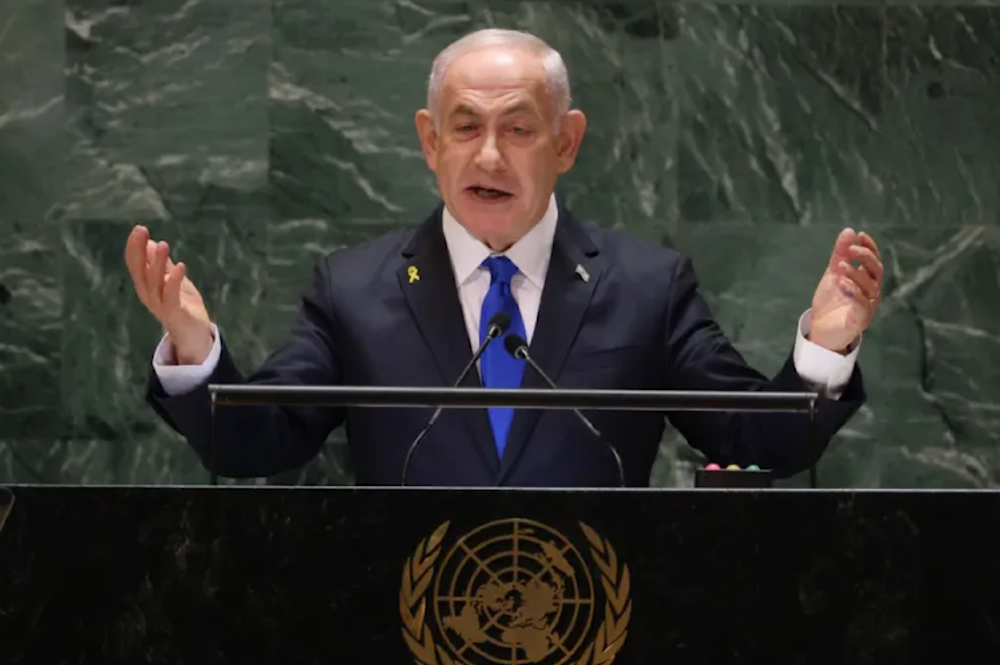'Israel' should beware of arrogance: National Interest
Netanyahu's government faces critical decisions regarding military strategy in Lebanon and Iran, with potential repercussions for Israeli settlers, the economy, and international .
-

Israeli Prime Minister Benjamin Netanyahu speaks during the 79th Session of the UNGA at the UN headquarters in New York City on September 27, 2024. (AFP)
According to National Interest, the initial successes achieved by "Israel" in its terror attacks against the Lebanese Resistance - Hezbollah, will not be enough to pull the occupation out of its misery after Operation al-Aqsa Flood.
The massive devastation wrought by October 7 has extended to shattering Israelis' confidence in once-respected public institutions – the government, the military, and the intelligence services – as the extent of their massive flaw becomes increasingly clear.
In its darkest hours, "Israel" was lost, and its leaders had seemingly abandoned it. A year later, those feelings are still there. Prime Minister Benjamin Netanyahu's promises to achieve "total victory" over the Palestinian resistance, Hamas, have become hollow. In fact, Israelis are either disappointed that his pledges have not been fulfilled, or they do not believe that such an achievement is even possible.
Losses mount, and negotiations to return Israeli captives have halted. Meanwhile, Hamas is regrouping from areas where the IOF withdrew.
On September 17, Israeli morale rose significantly, when attention suddenly turned to Lebanon, where thousands of Hezbollah members were unexpected victims of a terrorist pager attack.
Although it denied official responsibility, "Israel" was not shy in taking credit for the martyrdom of several Hezbollah leaders, including Sayyed Hassan Nasrallah on September 28.
However, this boost in confidence may only be temporary, since tens of thousands of Israelis are currently evacuated from their settlements and within direct range of fire from Hezbollah, with the number expected to increase as Hezbollah broadens its attacks.
On September 25, an unprecedented launch of rockets from Hezbollah toward Tel Aviv was witnessed, prompting Israeli media to caution that Hezbollah has neither been defeated nor broken following the recent assassinations against its members, adding that the Lebanese group remains capable of dealing with casualties and damage to "Israel."
Iran also launched a barrage of nearly two hundred missiles on October 1 in Operation True Promise 2.
Now, the Netanyahu government faces critical decisions on future military actions in Lebanon and against Iran, with concerns about escalating conflict and potential miscalculations leading to a wider war. This could signal a potential disaster not only for the Israeli settlers and infrastructure but also for its struggling economy and global standing.
In the absence of ideal options, Netanyahu's government—still largely unpopular among voters—finds itself just a few critical decisions away from either pulling Israelis out of their prolonged nightmare or making the dire situation even worse. The goal of “Returning the residents of the north securely to their homes,” could easily become its least problematic issue.
According to National Interest, Netanyahu's unsuccessful handling of recent discussions regarding a potential three-week ceasefire suggests he is moving in the wrong direction.
Netanyahu, who repeated his classic maneuver, initially supported the efforts, but then succumbed to objections from his coalition partners and retreated from his commitment. Additionally, the friction with the US regarding how to respond to Iran could mean isolation from the US and having to face Iran alone.

 3 Min Read
3 Min Read








